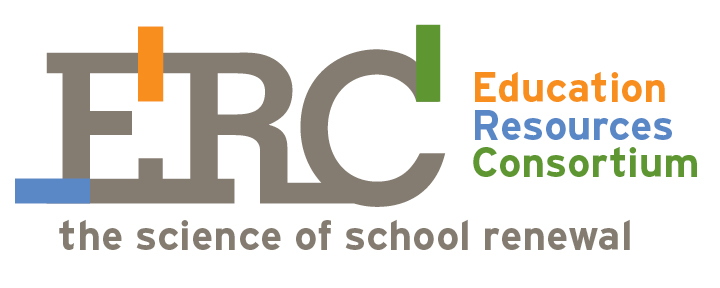Teaching for authentic achievement came together with state-of-the-art technology, social networking and media tools as ERC Consulting Practitioner Katrina Kennett travelled to Randolph (MA) High School in early June. A new Randolph High School Freshmen Academy Team, under the tutelage of Asst. Principal for Instruction Josh Frank, was treated to an afternoon ERC seminar designed to support their move to high-challenge, student-centered instruction and assessment. The seminar was titled “Student-Centered Classrooms: Authentic Achievement, Choice and Connectivity”.
Ms. Kennett was introduced by ERC Co-Founder Larry Myatt, as “a teacher’s teacher, whose thinking and practice incorporate critical elements needed to address four critical issues in today’s educational-political environment”. In his preliminary remarks Myatt defined those four challenges as the unprecedented levels of student disinterest in classroom instruction as reflected on surveys across the nation; the outsized appeal and availability of technology tools, social networking, and learning opportunities outside the classroom; the heightened importance and increasing role of performance assessment in classrooms to provide better understandings of links between student learning and instructional practice; and the need for teachers and administrators to be better able to define and portray what rigorous intellectual work looks like. “Kennett”, said Myatt “is able to bring those varying and diverse elements under one roof as a practitioner as she plans and executes state-of-the-art teaching and assessment”.
In her seminar at Randolph HS , Kennett provided some exemplar lessons designed with Fred Newmann’s definition of “authentic achievement”* in mind, went on to demonstrate her approach to “paperless research”, the use of “EdCafes” to leverage students’ passion and preferences, and an array of technology tools to support student’s critical thinking, revision and “ownership of deeper learning”. One of the theme questions that got the group’s attention was “Understanding Society Through Its Monsters”, a literature and social issues unit that linked students’ passion for the sensational and macabre with historical and literary figures through research, reading and critical essays and presentations, embellished and personalized with a range of high-tech tools and strategies.
Randolph teachers had a number of opportunities for questions about how to adopt Kennett’s strategies for their own classrooms. According to Frank, the Randolph team was “extremely enthusiastic” about Kennett’s presentation and would like to do more detailed work with her in the future. In particular, Frank went on, “Katrina’s was not a glitzy ‘technology demo’, but a deeper set of insights into how thoughtful teachers can employ these kinds of tools with solid planning and relationship-building to push for higher student engagement and achievement. This is the future of teaching and we got a look at it today”. Jamie Steinberg, 9th grade English teacher at RHS was even more direct –“I want to teach like that”, she said, “I want to create and use lessons and tools like she demonstrated, that make students want to push themselves harder”.
Interestingly, the Randolph team had just received some exciting news only days before when it was announced that some of the work of transforming the high school’s programming and practices, beginning with the Freshmen Academy, would be underwritten by a planning grant from the Nellie Mae Education Foundation. The grant enabled the scheduled work to get underway early, beginning with two “PD intensive” weeks this summer, rather than waiting for September. Myatt had been asked to assist Frank, working over the late winter and spring with a diverse, cross-grade study group of teachers in order to guide the design of a plan for re-thinking the 9th grade experience at Randolph HS to raise achievement and engagement levels and lower drop-out rates. In late April, Frank delivered the team’s recommendations to the Randolph school district administration for submission to the Nellie Mae foundation, with an emphasis on inquiry-based teaching, high levels of teacher collaboration, and building social/emotional resilience and relationships to support the increased academic demands. Kennett’s workshop was provided as a pro bono gesture by ERC to help catalyze the school’s efforts, and was the first formal professional development opportunity associated with the new and ambitious transformation agenda for the Freshmen Academy team designed to focus on student-centered learning. Randolph Superintendent Oscar Santos stopped by the high school the following morning to meet with Frank and the 9th grade team to express support and enthusiasm for the initiative.
A graduate of Connecticut College, Ms. Kennett teaches in the Plymouth MA Public Schools and is completing her Master’s Degree at San Diego State University. In addition to consulting with schools and individuals for ERC, Katrina serves as a leading presence on the Authentic Assessment Team for her school in the New England I3 Network, developing performance-based assessments and pioneering student choice as a motivating factor in student-centered classrooms. Ms. Kennett offers a range of model classrooms and through them is adept at guiding and supporting teachers in lesson design, instructional management, and effectively employing a range of connectivity strategies, including Twitter, Todaysmeet, Voicethread, SoundCloud and YouTube.
For more information on the supports for this effort at Randolph HS, please email Larry@educationresourcesconsortium.com.
*- Newmann, Secada, and Wehlage; Newmann, King and Carmichael.
